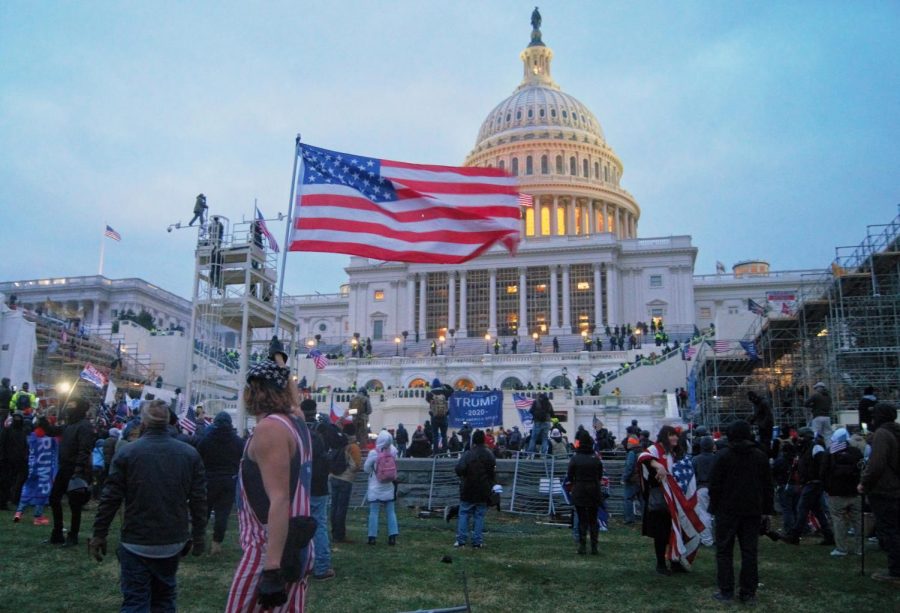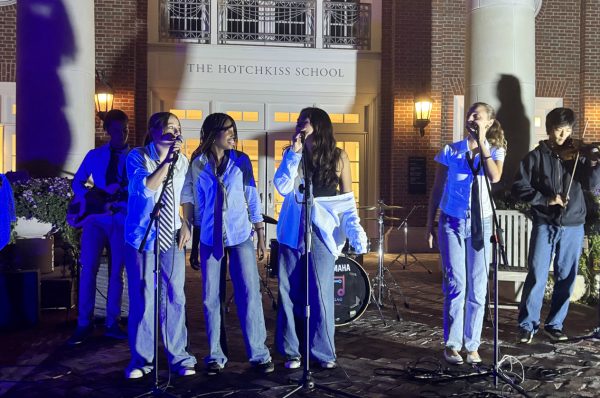School Reflects on Capitol Siege
Rioters invaded the Capitol building and occupied it for four hours on January 6.
On January 6, former President Donald Trump gave a speech entitled “Save America” at a rally in Washington D.C., which drew tens of thousands of people. Following the speech, several thousand protesters marched down Pennsylvania Avenue and stormed the U.S. Capitol building in an attempt to disrupt Congress’s joint session to certify the electoral vote count confirming President Joe Biden’s victory.
After pushing past police, rioters invaded the Capitol building and occupied it for four hours. Various Trump supporters, including a QAnon “shaman,” members of the white nationalist group the Proud Boys, two Air Force veterans, and elected officials, were heard chanting “Second American Revolution,” “Stop the Steal,” and “Hang Pence.”
The assault prompted the immediate evacuation of lawmakers from the Capitol and resulted in five deaths, including that of Brian D. Sicknick, a Capitol police officer. While many participants initially left the scene, law enforcement investigations have led to over 150 arrests to-date. House Speaker Nancy Pelosi (D-CA 12th District) labeled the riot “an attempted coup,” and Senate Minority Leader Mitch McConnell (R-KY) blamed Trump for inciting the violence. McConnell said, “The mob was fed lies. They were provoked by the president and other powerful people.” Senator Sherrod Brown (D-OH) also condemned Senators Ted Cruz (R-TX) and Josh Hawley (R-MO) for instigating the violence. Brown tweeted, “Both @HawleyMo and @SenTedCruz have betrayed their oaths of office and abetted a violent insurrection on our democracy. I am calling for their immediate resignations. If they do not resign, the Senate must expel them.”
On Wednesday, January 13, the House impeached President Trump for “inciting insurrection,” making him the first president in United States history to be impeached twice. Amidst FBI warnings of emboldened extremist activity, Congress has scheduled the Senate trial to be held after Biden’s inauguration. If more than two-thirds of the Senate votes for impeachment, Trump will be convicted. After conviction, Congress can invoke the third section of the Fourteenth Amendment, which would bar Trump from holding federal public office at any level in the future.
With the country more divided than ever, the school’s Council on Diversity and Inclusion convened at a community fishbowl to reflect on the events and seek new ways to overcome the widening political chasm. Elizabeth Oliver ’22 participated in the pro-Trump rally outside the Capitol, but she left around 2:30 p.m. when she saw smoke billowing and people pushing into the front doors of the building. Oliver stressed the importance of distinguishing between peaceful protestors and rioters. During the open discussion, she said, “I absolutely condemn the violence. Violence on any side should be punished – [it] doesn’t matter if you’re a Democrat, Republican, conservative, or liberal. [Also,] I think there’s a distinction that needs to be made between the violence that happened at the Capitol [and the peaceful protesters at the rally].”
Many students at the Fishbowl raised concerns about a racially biased double-standard in law enforcement’s reactions to protestors, agreeing with Biden’s sentiment that law enforcement treated the Capitol rioters “very, very differently” than they would have treated Black Lives Matter demonstrators. Alimatu Fatty-Branch ’21 said, “As a Black woman in this country, seeing the hypocrisy which surrounded the Trump riots on Wednesday not only angered me but instilled [in me] the same sense of isolation I felt at the beginning of the summer. To know that to fight for my civil rights as a Black person in this country might result in my death, whilst those who committed arbitrary acts of terrorism were shown leniency by the same authority figures who would not hesitate to deem me a ‘thug,’ emphasizes the height of white privilege [in] American society.”
Much of the evening’s discussion centered around the challenges of these fractured times and the degree to which democracy is under siege. Arguing that the road to restoration requires a commitment to holding people accountable for their actions, Hotchkiss Democrats Club Head Langston Harris ’21 said, “The protestors and domestic terrorists [who] stormed the Capitol must be charged and prosecuted. The Senators and Representatives [who] peddled these lies should be barred, censured, expelled, or prosecuted. The President should have been removed by way of the 25th Amendment [or] impeached by the House and then convicted by the Senate so that he can never hold public office again. Only then [can] we look to promote unity and be able to move on from these dark events.”
On Wednesday, January 20, two weeks after the storming of the Capitol, Joe Biden and Kamala Harris were sworn into office as the President and Vice President of the United States.
In response to threats of another violent assault on the Capitol, officials fortified the Capitol with 25,000 National Guard troops and thousands of police officers. Even so, the streets of Washington D.C. remained calm in the absence of demonstrators, and the inauguration represented a peaceful transition of power.





